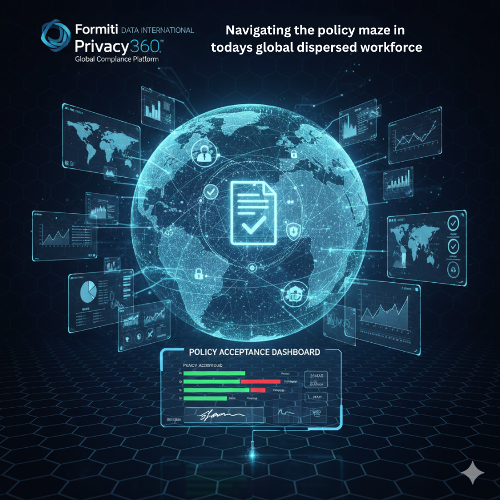Navigating the Global Policy Maze: Ensuring Compliance, Transparency, and a Full Audit Trail
In an increasingly interconnected world, global organizations face a unique set of challenges in managing their internal policies. From data privacy regulations like GDPR and CCPA to industry-specific compliance mandates, the sheer volume and evolving nature of policies can be overwhelming.
The critical task of ensuring every employee and contractor across diverse geographical locations not only receives but also understands and formally accepts the latest policy updates is a monumental undertaking. This article delves into these intricate challenges and highlights solutions for achieving robust compliance, undeniable transparency, and a comprehensive audit trail.
The Multifaceted Challenges of Global Policy Management
Distributing, tracking, and auditing policy documents for a global workforce is far more complex than simply emailing a PDF. The challenges can be broken down into several key areas:
1. Geographical Dispersion and Cultural Nuances:
- Varying Regulations: Each country and region may have distinct legal and regulatory frameworks that impact policy content and enforcement. What's compliant in one territory might be insufficient or even contradictory in another.
- Language Barriers: Policies must be available in the native languages of all employees, which often requires professional translation and localization to ensure accuracy and cultural appropriateness.
- Accessibility: Reliable access to digital documents can vary. Some regions may have limited internet access or rely on different technological infrastructure.
2. Version Control and Dissemination:
- Keeping Pace with Change: Policies are not static. Regulatory updates, organizational shifts, and new risks necessitate frequent revisions. Ensuring everyone is always working from the most current version is a constant battle.
- Effective Distribution Channels: Relying on email alone is insufficient. Emails can be missed, filtered, or lost. A centralized, easily accessible system is paramount.
- Proof of Receipt: Simply sending a policy doesn't prove it was received or read. Organizations need a mechanism to confirm delivery and engagement.
3. Demonstrating Understanding and Acceptance:
- Beyond the "Read Receipt": Acknowledging receipt is one thing; confirming understanding and agreement is another. Organizations need mechanisms for employees to formally accept policies.
- Attestation Fatigue: Overly burdensome acceptance processes can lead to employee fatigue and non-compliance. The system must be intuitive and efficient.
- Training and Education: Policies are only effective if employees understand their implications. Integration with training modules can significantly enhance comprehension.
4. The Imperative of a Full Audit Trail:
- Regulatory Scrutiny: Regulators, auditors, and legal teams demand irrefutable proof of compliance. This includes who received which policy, when they received it, and when they formally accepted it.
- Forensic Capabilities: In the event of a breach, incident, or legal challenge, the ability to quickly and accurately demonstrate compliance efforts is critical for mitigating risk and avoiding penalties.
- Transparency and Due Diligence: A transparent audit trail is essential for demonstrating due diligence to stakeholders, investors, and business partners. Without it, an organization's reputation and financial stability are at risk.
Q&A: Answering Your Top Policy Management Questions
Q: We are a global company. Can't we just use our existing intranet or an email-based read-receipt system?
A: While intranet portals and email are good for communication, they fall critically short for compliance and due diligence. They typically fail to provide:
- An immutable audit trail: Can you prove, with legal certainty, that a specific employee accepted version 3.1 of a policy on a specific date, and not just that they received an email?
- Version control: Intranets often lead to employees accessing outdated documents.
- Targeted distribution: It's difficult to manage different policies for different jurisdictions (e.g., a "California-only" addendum) efficiently.
- Automated reporting: You cannot get a real-time, global dashboard of your compliance status. An enterprise platform like Privacy360 is built to handle these specific audit and versioning requirements.
Q: What is the single biggest risk of not having a robust policy distribution system?
A: The biggest risk is indefensibility. In the event of a data breach, employee misconduct, or a regulatory investigation, you will be asked to prove your due diligence. If you cannot produce a clear, time-stamped audit trail showing that the relevant staff were trained on and accepted the correct policies, you face significantly larger fines, legal liability, and irreparable reputational damage. It shifts the conversation from "an employee made a mistake" to "the company failed to provide adequate governance."
Q: We have both full-time employees and a large number of international contractors. How do we manage policies for them?
A: This is a critical area of risk. Regulators often hold organizations accountable for the actions of their third-party contractors and contingent workforce. A dedicated platform is essential for managing this. It should allow you to:
- Onboard and offboard contractors with specific policy acceptance workflows.
- Distribute relevant policies (e.g., data handling, confidentiality) without giving them access to your full internal HR system.
- Maintain a full audit trail of their acceptance, which is vital for managing third-party risk.
Q: My team is already overloaded. Won't implementing a new platform just add more work?
A: It's a common concern, but the right platform delivers a significant return on investment by reducing the administrative burden. Manual tracking via spreadsheets, follow-up emails, and report building is incredibly time-consuming and prone to human error. A compliance platform automates these tasks. It handles the reminders, escalations, and report generation, freeing your compliance, HR, and legal teams to focus on strategy rather than administration.
The Solution: An Enterprise-Class Platform for Global Policy Management
Addressing these challenges effectively requires more than manual processes or disparate tools. Global organizations need a unified, intelligent platform designed specifically for policy distribution, acceptance tracking, and robust auditing.
Key Features of an Ideal Policy Management Platform:
- Centralized Document Repository: A single source of truth for all policy documents, ensuring only the latest versions are accessible.
- Multi-Language Support: Automated or integrated translation services to provide policies in local languages.
- Targeted Distribution: The ability to assign specific policies to relevant groups, departments, or geographical locations.
- Mandatory Acceptance Workflows: Automated processes that require employees to formally acknowledge and accept policies, often with digital signatures.
- Automated Reminders and Escalations: Systems to prompt employees who haven't yet accepted policies and escalate to management if necessary.
- Comprehensive Reporting and Analytics: Dashboards providing real-time insights into compliance status across the organization.
- Impenetrable Audit Trails: Detailed, immutable records of every policy interaction – distribution, access, acceptance, and version history.
- Integration Capabilities: Seamless integration with HRIS, learning management systems (LMS), and other enterprise platforms.
Privacy platforms offers a holistic approach to data privacy and compliance, with multiple modules that work in concert to create a secure and compliant operational environment. By choosing Formiti Data International, organizations gain not only an expert technology partner but also access to deep industry knowledge to navigate the evolving landscape of global regulations.

